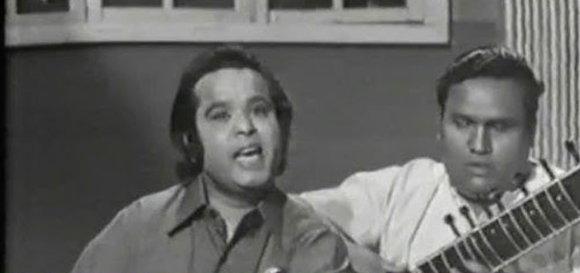Lahore (Web Desk): On the 41st death anniversary of Salim Raza, being observed today (Monday), the world of classical music and Pakistani cinema remembers a voice that transcended mere melody, a voice that conveyed sorrow, longing, and heartache in its purest form.
Born as Noel Dias on March 4, 1932, in Amritsar, this maestro of melancholic ballads wove magic with every note, etching his name in the annals of film history. He graced the music of Pakistan with his unmistakable voice, becoming an epitome of emotional depth, especially in the realm of ghazals and heart-rending nazms.
Salim Raza’s career took flight in Lahore, where he was first introduced to the Pakistani film industry by the renowned director Ghulam Ahmed Chishti.
His voice, rich with the essence of classical ragas, found its first grand canvas in the 1955 film Naukar. Here, he lent his soul-stirring rendition to the immortal duet "Taqdeer kay malik deikh zara kya zulm hai", a song that became emblematic of his ability to evoke the deepest sorrow with a mere breath.
But it was not just this song that made him a legend. Salim Raza’s vocal timbre, paired with his mastery of classical music, graced numerous iconic tracks throughout his career.
Among these were heart-wrenching solos such as "Meri Zindagi Hai Nayi, Tu Aaye To Zindagi Aaye" from Zindagi (1960), a composition that showcased his deftness in blending emotional fragility with grandeur.
His rendition of "Kahan Tak Main Yeh Dua Karoon", from the 1964 film Meri Zindagi, remains a timeless classic, capturing the ache of unfulfilled longing.
The song "Dil Tere Ishq Mein", featured in the 1964 film Dil Tera Deewana, further cemented his status as a master of tragic romance.
With his mellifluous voice, he painted a picture of love’s heartache, so tangible, it lingered in the air long after the music stopped.
His ghazals, filled with veiled emotions and dripping with classical allure, became the soundtrack of hearts broken and unspoken, often echoing in the solitude of a night untouched by time.
A true disciple of classical music, Salim Raza’s mastery was not limited to the silver screen. His renditions in film qawwalis and traditional nazms left an indelible mark on Pakistani music, blending formal ragas with folk expressions. He sang for legendary music directors like Nisar Bazmi, Ahmad Sadeq, and others who trusted his voice to give form to their musical dreams.
Sadly, Salim Raza's journey was cut short by the cruel hand of kidney failure, and he passed away on November 25, 1983.Yet, his voice remains immortal, continuing to echo through the corridors of time. With every song, he touched the heartstrings of millions, reminding us of the beauty that lies in sorrow and the power of a voice that speaks the language of the soul.
The legacy of Salim Raza endures in his songs, his evocative voice, and his indelible contribution to the cultural tapestry of Pakistan.
As we remember him today, it is with the knowledge that his melodies will never fade, forever cherished by those who have known the quiet strength of a song sung from the depths of the heart.


